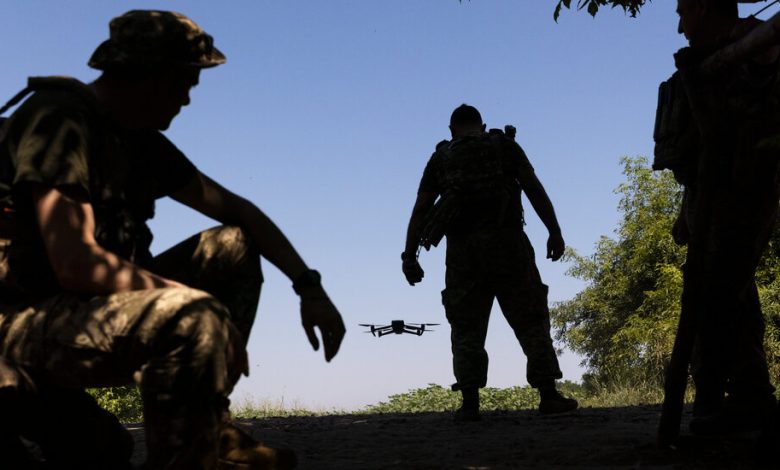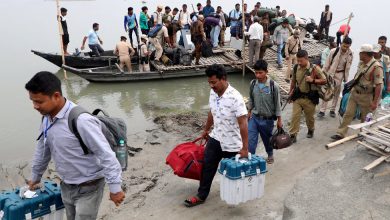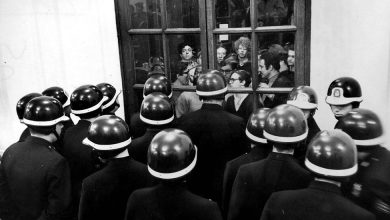Have Gear, Will Deliver: Why I Carry Supplies to Ukrainian Troops

This past summer, Britain’s defense minister at the time, Ben Wallace, chided Ukraine for not showing enough gratitude for the West’s weapons supplies. “We’re not Amazon,” he said.
No, but there is a kind of Amazon for the Ukrainian military, in analog form: a network of civilian volunteer groups that deliver an array of goods to soldiers in the field, on request.
I know because I’m one of those volunteers. We deliver tourniquets, chest seals for lung wounds, observation drones, night vision monoculars, power banks, underwear and feet warmers, all within a few days. A secondhand four-wheel-drive vehicle or a thermal drone takes a little longer, up to two weeks.
Volunteerism has played a powerful role in Ukraine’s recent history. Volunteers maintained the barricades during the 2014 revolution on Maidan Square, and many of the fighters resisting the Russian move into Donbas later that year were civilians. When Russia launched its full invasion in 2022, large numbers of Ukrainians volunteered to fight. Millions of Ukrainians have in turn mobilized to support those men and women: An opinion poll conducted that summer, when the economy was already suffering from Russian attacks, found 86 percent of Ukrainians had donated to charities and 33 percent were actively volunteering.
Supplying the army quickly, often with imported items, could not easily be done otherwise: The military’s lingering post-Soviet bureaucracy makes reacting to its own soldiers’ needs difficult. Soldiers get kitted out with gear when they sign up, but lost or damaged items, from socks to helmets, are not automatically replaced. The Defense Ministry is busy dealing with big-ticket items, distributing tanks and heavy weapons coming in from all over the world.
That’s how we, the volunteers, ended up fund-raising and supplying so many essential bits and pieces through ad hoc arrangements with parts of the Ukrainian military. In the grand scheme of things, our individual efforts are minuscule, but they are lifesaving all the same.
Two of the biggest nonstate volunteer groups, Come Back Alive and the Serhiy Prytula Charitable Foundation, provide cars and armored vehicles, night- and thermal-vision instruments, drones and other items to the army. Odesa-based Wave91 alone supplies hundreds of Chinese-made Mavic camera drones and fabricates thousands of first-person-view drones.
My most recent delivery was to the 3017th Military Unit of the Ukrainian National Guard.
The 3017th fought for some five months in Bakhmut this year and was recently stationed near Zolochiv, north of Kharkiv, 10 miles from the Russian border. With this information in hand, I start off in a Mitsubishi pickup truck bought in Britain with money raised in Poland. The steering wheel is on the right side, but I learned to drive British-style vehicles on my last delivery, a Nissan pickup that I took to soldiers in Odesa.
I pick up the vehicle in Berlin. On the Polish side of the Rava Ruska border crossing into Ukraine, I am waved through. On the Ukrainian side, the customs officers know me from previous deliveries, so things go smoothly there, too. An hour later in Lviv I meet up with Olga Shpak, a biologist specializing in whales who abandoned her research, friends and apartment in Moscow two days before the invasion to return to her native Kharkiv. She now is a representative there for another volunteer group, Assist Ukraine, co-founded by the retired NPR journalist Anne Garrels.
Small and flexible groups like these are crucial in this war because the big international humanitarian organizations shy away from anything remotely military. Even a lifesaving tourniquet smells martial to them. But, as Ms. Garrels said soon after the invasion, Ukrainians “don’t need teddy bears, they need flak jackets.”
Ms. Shpak is a one-stop supplier for the military units she knows. Their needs range from dry showers and insect repellent to night-vision devices. She finds the product on the market — in Ukraine or abroad, via the producer or online — and buys it with funds from Assist Ukraine or similar groups, and then organizes the delivery. “Can you urgently find a sturdy pickup for the 3017th?” she had texted me. Soon, it was in the unit’s shopping cart.
Now, in a convoy of two we go — a whale expert and a writer — to Zolochiv to hand over the Mitsubishi and tourniquets to the National Guard unit. Ms. Shpak deals with paperwork for the vehicle, while I am given a tour of the unit’s living quarters by Dima, the 26-year-old commander of the 150-soldier unit. We film a short “thank you” video of the vehicle’s transfer for the main donors. Volunteer work is based on mutual trust, so filming deliveries is a form of accountability.
Along with being an accidental procurement assistant, I am also a fund-raiser: I raise money from a motley group. I reached out to Swedes through a Stockholm-based journalist. A Jewish group from New York contributed over $5,000. An exiled Russian-born film director and her colleagues sent even more. An Australian friend reached out to a wealthy acquaintance, who wired $5,000 on his way to visit Antarctica.
The next morning, back in Kharkiv, we swing by Ms. Shpak’s warehouse, where she has squirreled away all sorts of goodies: medicine, uniforms, backpacks, flashlights, batteries, binoculars. She prepares herself like a military Santa Claus, stuffing boxes and bags with what she will distribute to the soldiers. She assigns me the task of sorting by size 100 colorful boxer briefs sewn by Ukrainian refugees in Austria.
That afternoon, we drive about three hours to Kramatorsk, where we meet our first taker: Gena, a former hair dye producer, who is now a soldier in the 225th Battalion. Along with some boxers, he takes power banks and special multilayered survival blankets that serve not so much to provide warmth as to conceal positions from the Russians’ thermal cameras. The star of this delivery is a Mavic-3 drone that I bought on eBay in the United States.
Recently, units’ requests have been getting more eclectic — and more desperate. For my next delivery, we are now shopping for four-pronged spider boots, which provide some protection from mines, and hoverboards, which can be used to build demining robots. Both items point to the increasingly urgent effort to reduce injuries and deaths from Russian mines.
I for one have never seen a war effort — and I have reported on several dozen conflicts — relying so much on volunteerism, although a similar spirit fueled the Solidarity revolution in my native Poland.
The Ukrainians are committed because their lives depend on it. In order not to run out of people to defend their country, they do whatever they can to support those on the front lines. So, many civilians in Ukraine find it easier to be volunteers than to do nothing at all.
As for me, a journalist who has thrown impartiality to the winds, I feel a little less guilty knowing I tried to do something to stop this madness. So once in a while I bring supplies, always for small groups, always items that were specifically requested. I’m just fulfilling orders.
Anna Husarska is a journalist and political analyst.
The Times is committed to publishing a diversity of letters to the editor. We’d like to hear what you think about this or any of our articles. Here are some tips. And here’s our email: [email protected].
Follow The New York Times Opinion section on Facebook, Twitter (@NYTopinion) and Instagram.



